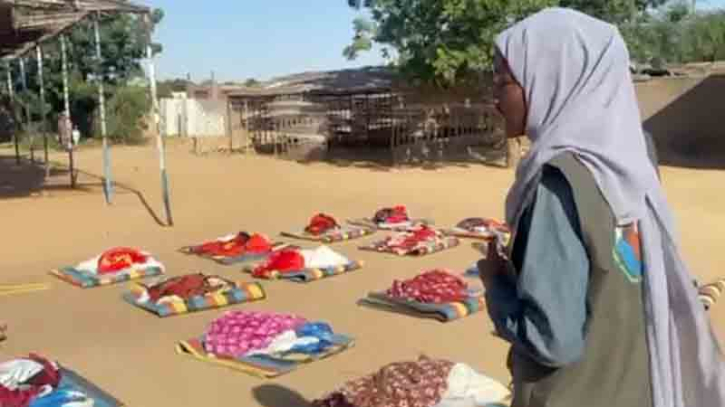
সুদান
Inside El-Fasher: The Human Cost of Sudan's Forgotten War
Two years into Sudan’s brutal civil war, the city of el-Fasher in Darfur stands as a symbol of unimaginable human suffering. Under siege for over a year by the Rapid Support Forces (RSF), the city has been cut off from the outside world, its people trapped in a cycle of bombardment, fear, and loss.
Thanks to a network of smuggled phones provided by the BBC World Service, rare testimonies have emerged from residents like Hafiza, Mostafa, and Manahel—revealing the raw, unfiltered reality of life inside this besieged city.
A Daughter in Mourning
“She left no last words. She was dead when she was carried away,” whispers 21-year-old Hafiza, describing the day her mother was killed in a marketplace hit by shellfire in August 2024.
Left to care for her three younger siblings, Hafiza’s grief is compounded by responsibility. Her father had died before the war began. With her family scattered for safety, Hafiza remained in el-Fasher, earning a meager living through community work—distributing blankets, serving in kitchens, and raising awareness about breast cancer.
“I remember the places where my mother and siblings used to sit. I feel broken,” she says in one of her early video messages.
Under Siege, Under Fire
In nearly every video 32-year-old Mostafa sends, the rumble of artillery and crack of gunfire are constant. After returning home from a family visit, he found his house in ruins, shelled and looted.
“Most homes in our neighborhood have been looted,” he says, blaming RSF forces.
While volunteering at a shelter, an intense attack erupted. He kept his camera rolling as explosions rained down nearby.
“There is no safe place in el-Fasher. Death can strike anyone, anytime—by bullet, shell, hunger, or thirst.”
Cooking to Survive
Manahel, 26, had just completed her university degree in Sharia and law when the war reached her doorstep. Forced to flee with her mother and siblings, she began volunteering in a community kitchen, preparing what might be the only meal displaced families receive in a day.
Her father refused to leave their original home, staying behind to protect neighbors’ belongings. It cost him his life.
"Every family is equal now—there is no rich or poor. People can’t afford food,” she explains.
“As a Girl, I Might Get Raped”
For Hafiza and Manahel, the fear goes beyond hunger and violence. Both belong to non-Arab ethnic groups—the very communities reportedly targeted by RSF fighters during the massacres in el-Geneina, a city 400 km away.
“If the city falls, I’m scared I’ll be raped,” Hafiza confides.
In 2023, the U.S. and rights groups accused RSF and allied militias of committing genocide in el-Geneina, targeting the Massalit and other ethnic groups. Reports included widespread killings and sexual violence, including gang rape of minors.
A City Silenced
The RSF, now controlling most access in and out of el-Fasher, denies responsibility for any atrocities. When BBC journalists visited RSF-controlled el-Geneina after months of negotiations, they were closely monitored and shown only what officials permitted. Fighters openly patrolled the streets, and civilians were hesitant to speak freely.
“There are no civilians in war zones,” one RSF commander declared. “Everyone here is part of the fight.”
Despite claims that el-Geneina is now “peaceful” and that residents have returned, hundreds of thousands remain in refugee camps across the border in Chad.
A False Peace
In an interview with West Darfur Governor Tijani Karshoum, who replaced a predecessor killed after accusing RSF of genocide, denials echoed official talking points. Just two weeks later, the European Union imposed sanctions on Karshoum, citing his involvement in serious human rights violations, including killings and sexual violence.
Karshoum denied the allegations but said he would cooperate with an independent investigation.
Exodus from El-Fasher
In November 2024, Hafiza, Mostafa, and Manahel—after months of fear, hunger, and trauma—finally fled el-Fasher to nearby towns. As the war drags on, Darfur remains the last major region where the RSF is still entrenched, and el-Fasher has become a critical—and deadly—battleground.
“El-Fasher has become scary,” said Manahel as she packed her belongings. “We are leaving without knowing our fate. Will we ever return? When will this war end?”
































.png)
.png)







